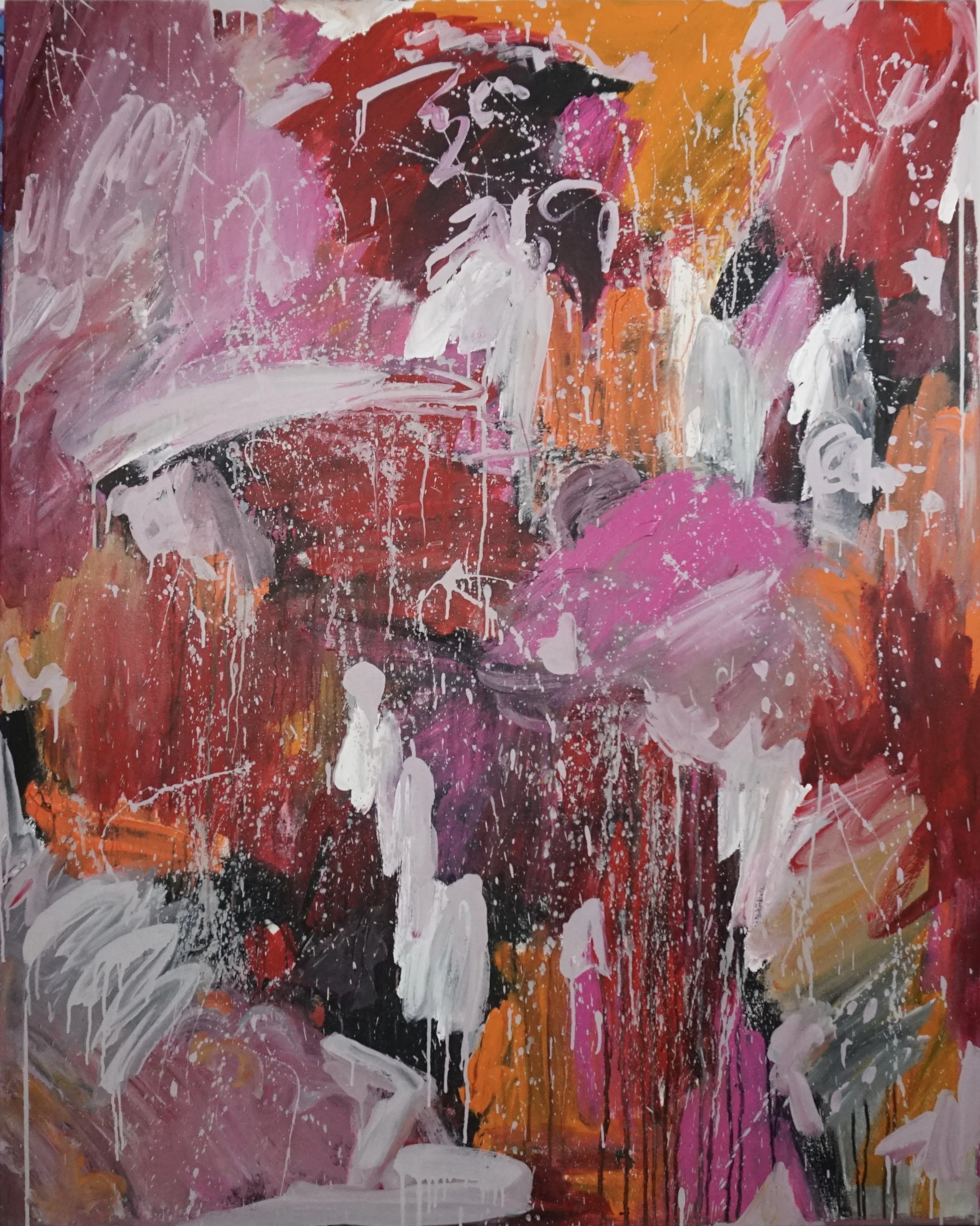Jeong-Ah Zhang
Jeong-Ah Zhang
Exploring the Metaphysical Depths: The Art of Jeong-Ah Zhang
Jeong-Ah Zhang is a distinguished contemporary artist hailing from Seoul, South Korea, whose oeuvre transcends the boundaries of painting, photography, and mixed media. Her work beckons viewers to traverse the liminal spaces of consciousness, presenting a surrealist exploration that reflects deeply on the human condition and the universe's inherent mysteries. Zhang's artistic journey, underpinned by a robust academic foundation from Ewha Women's University and extensive exhibition history, is a testament to her profound engagement with philosophical and metaphysical concepts.
Zhang's art is deeply rooted in the contemplative traditions of Oriental Buddhist philosophy, though she approaches these ideas from a secular, personal perspective. Her works are not mere representations of religious motifs but are rather intricate reflections of her introspections on life and existence. She draws upon the Buddhist notion that all things operate mysteriously without true substance, using this as a scaffold to explore the transient nature of reality and consciousness.
Her statement, "My life is my experiences, which are, in turn, the evidence of my life," encapsulates the essence of her work. Zhang's art is a dialogue between the visible and invisible realms, a symbiosis of the metaphysical and the tangible. This philosophical underpinning is evident in her use of symbols, metaphors, and imagery that resonate with the nature of life and the principles governing the universe.
Zhang's paintings are characterized by their surrealist elements, which often blur the boundaries between reality and imagination. Her canvases are populated with dreamlike landscapes, ethereal figures, and abstract forms that invite viewers to question the nature of their own perceptions and experiences. The interplay of light and shadow, color and form, creates a dynamic visual narrative that is both captivating and thought-provoking.
Her work often employs a palette that ranges from muted, earthy tones to vibrant, otherworldly hues, reflecting the duality of existence and the spectrum of human emotions. This chromatic diversity enhances the surreal quality of her paintings, allowing her to explore themes of creation, extinction, and the cyclical nature of the universe.
Jeong-Ah Zhang's extensive exhibition history includes five solo shows in both Korea and the USA, and participation in over 80 group shows and art fairs across the globe, including France, Italy, Spain, Japan, and the UK. This international exposure has cemented her reputation as a significant figure in contemporary art. Her works have garnered critical acclaim and numerous accolades, with 39 international awards and 15 domestic recognitions attesting to her artistic prowess and the universal appeal of her work.
At the heart of Zhang's work is a profound engagement with metaphysical themes. She sees the universe as a complex interplay of consciousness, unconsciousness, and the subconscious, a notion that she intricately weaves into her art. Her paintings often feature motifs that symbolize the cyclical nature of existence, the interplay of creation and destruction, and the ephemeral nature of life.
One of the recurring symbols in her work is the motif of the mirror, which serves as a metaphor for self-reflection and the exploration of the inner self. This symbol not only reflects the visible world but also hints at the hidden layers of the subconscious, urging viewers to delve deeper into their own psyche.
Critics have lauded Zhang's ability to merge the philosophical with the aesthetic, creating works that are as intellectually stimulating as they are visually stunning. Her art invites contemplation and introspection, challenging viewers to reconsider their understanding of reality and their place within the cosmos. The surrealist elements in her work have been compared to the likes of Salvador Dalí and René Magritte, yet her distinct approach imbues her paintings with a unique voice that is unmistakably her own.
Zhang's work has been described as a "soul resonance beyond the time frame," capturing the timeless and universal aspects of human experience. This timeless quality, coupled with her philosophical depth, makes her art resonate with audiences across different cultures and backgrounds.
Jeong-Ah Zhang's work stands at the fascinating intersection of traditional philosophies and contemporary artistic practices. This juxtaposition is one of the hallmarks of her style, where ancient Eastern philosophies are brought to life through the lens of modern surrealism. Zhang’s paintings are imbued with a timeless quality, yet they also engage with contemporary issues and sensibilities, making her work both deeply rooted in tradition and refreshingly modern.
Her deep understanding of traditional art forms and techniques is evident in her meticulous attention to detail and the careful composition of her works. However, Zhang does not confine herself to traditional methods alone. Her exploration of mixed media and photography demonstrates a willingness to innovate and experiment, allowing her to express her ideas in multifaceted ways. This blending of old and new creates a dynamic tension in her work, inviting viewers to explore the continuum between past and present, reality and imagination.
Nature and the universe play a central role in Zhang's artistic vision. Her work often reflects a profound reverence for the natural world and its cyclical processes. This is not merely an aesthetic choice but a philosophical one, as she seeks to capture the essence of life’s perpetual motion – the cycles of birth, growth, decay, and rebirth.
Zhang’s use of natural elements serves as a metaphor for the larger metaphysical themes she explores. For instance, the recurring imagery of water in her paintings symbolizes fluidity and the continuous flow of time and consciousness. Mountains, trees, and celestial bodies are also prevalent, each representing different facets of the universal cycle and human existence within it.
The cosmic perspective is another significant aspect of her work. Zhang often incorporates celestial themes, depicting stars, planets, and nebulas to evoke the infinite and mysterious nature of the universe. These elements underscore the idea that human existence is part of a larger, interconnected cosmos, encouraging viewers to ponder their place in the grand scheme of things.
One of the most compelling aspects of Zhang’s art is its emotional resonance. Her works evoke a wide range of emotions, from awe and wonder to introspection and melancholy. This emotional depth is a testament to her ability to connect with viewers on a profound level, allowing them to engage with the work both intellectually and emotionally.
Zhang’s art is deeply personal, reflecting her own philosophical musings and life experiences. Her introspective approach invites viewers to embark on their own journeys of self-reflection. The symbolic and metaphorical nature of her work acts as a mirror, encouraging individuals to explore their own thoughts, feelings, and perceptions.
Understanding Zhang's artistic process provides further insight into the depth and complexity of her work. Her creative process is both disciplined and intuitive, involving extensive contemplation and reflection. Zhang often begins with a conceptual framework, grounded in her philosophical inquiries, and then allows her intuition to guide the actual creation of the artwork. This blend of structure and spontaneity results in works that are both thought-provoking and organically expressive.
Zhang’s meticulous approach to her craft is evident in the detailed and layered nature of her paintings. She employs a variety of techniques to create texture and depth, such as layering different media, incorporating photographic elements, and using intricate brushwork. This technical prowess enhances the visual impact of her work, making each piece a rich tapestry of meaning and emotion.
Jeong-Ah Zhang’s impact on the contemporary art world is significant. Her unique blend of surrealism, philosophical inquiry, and technical mastery has earned her a dedicated following and critical acclaim. As she continues to evolve as an artist, it is likely that her work will only grow in depth and complexity.
Looking ahead, Zhang's future projects promise to further explore the intersections of consciousness, nature, and the universe. Her willingness to push the boundaries of her medium and delve into new thematic territories suggests that her best work may still be yet to come. As she continues to navigate the delicate balance between tradition and innovation, Zhang remains a compelling and influential figure in contemporary art.
Jeong-Ah Zhang's art is a profound exploration of the metaphysical dimensions of life. Her ability to translate complex philosophical ideas into compelling visual narratives sets her apart in the contemporary art scene. Through her paintings, she invites viewers to embark on a journey of self-discovery and contemplation, to explore the boundaries of their consciousness, and to find meaning in the transient nature of existence.
Zhang's work is a testament to the power of art to transcend the material world and touch upon the deeper truths of the human condition. Her paintings are not just artworks; they are meditative spaces that offer a glimpse into the mysteries of life and the universe. As she continues to push the boundaries of her craft, Jeong-Ah Zhang remains a vital and influential voice in the world of contemporary art, offering profound insights into the nature of existence and the metaphysical realms that lie beyond.
By Marta Puig
Editor Contemporary Art Curator Magazine











